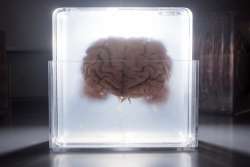Wouldn’t it be fun if there was a gadget that could predict our movements? Well, there isn’t any need of one as what could make such predictions is already inside our brains.
As per researchers, there’s a part of the brain called ‘physics engine’ that could tell before hand when people are ready to catch, dodge, hoist or take any necessary action.
Also, this engine is an essential aspect of cognition for survival in human beings.
The study showed that physics engine, which comes alive when people watch physical events unfold, is not in the brain's vision centre, but in a set of regions devoted to planning actions in the brain.
The study suggests that the brain performs constant real-time physics calculations so people are ready to take any necessary action on the fly, the researchers said.
"The study suggests that physical intuition and action planning are intimately linked in the brain," said lead author Jason Fischer, Assistant Professor at the Johns Hopkins University in Maryland, US.
"We run physics simulations all the time to prepare us for when we need to act in the world and is among the most important aspects of cognition for survival," Fischer added.
The team conducted a series of experiments to find the parts of the brain involved in physical inference.
They found that when subjects attempted to predict physical outcomes, the premotor cortex and the supplementary motor area - the brain's action planning areas are the most responsive brain regions.
"We believe this might be because infants learn physics models of the world as they hone their motor skills, handling objects to learn how they behave. Also, to reach out and grab something in the right place with the right amount of force, we need real-time physical understanding," Fischer explained.
The findings may offer insight into movement disorders such as apraxia, as it's possible that people with damage to the motor areas of the brain also have "a hidden impairment" or trouble making physical judgments.
A better understanding of how the brain runs physics calculations might also enrich robot design. A robot built with a physics model, constantly running in its programming almost like a video game, could navigate the world more fluidly, the researchers concluded in the paper published in the journal Proceedings of the National Academy of Sciences.
(With IANS inputs)
